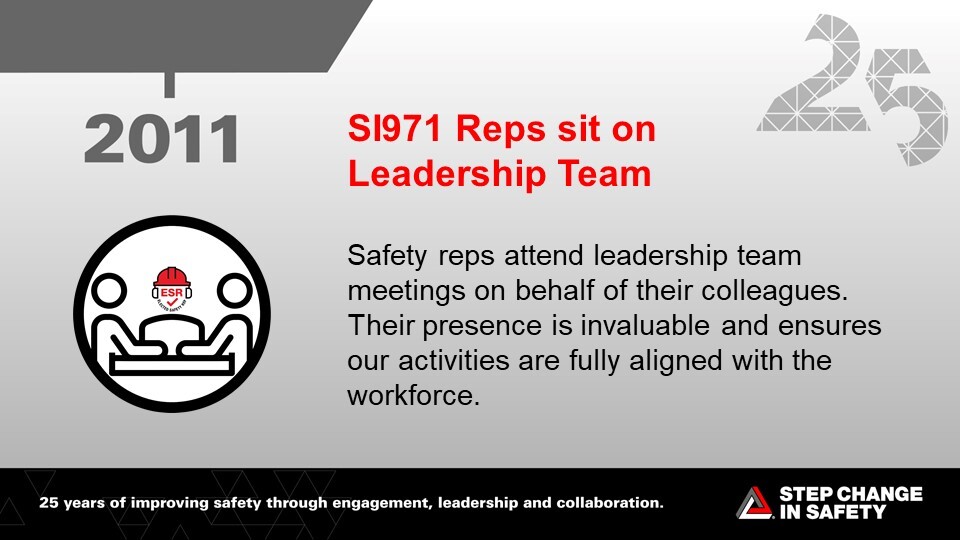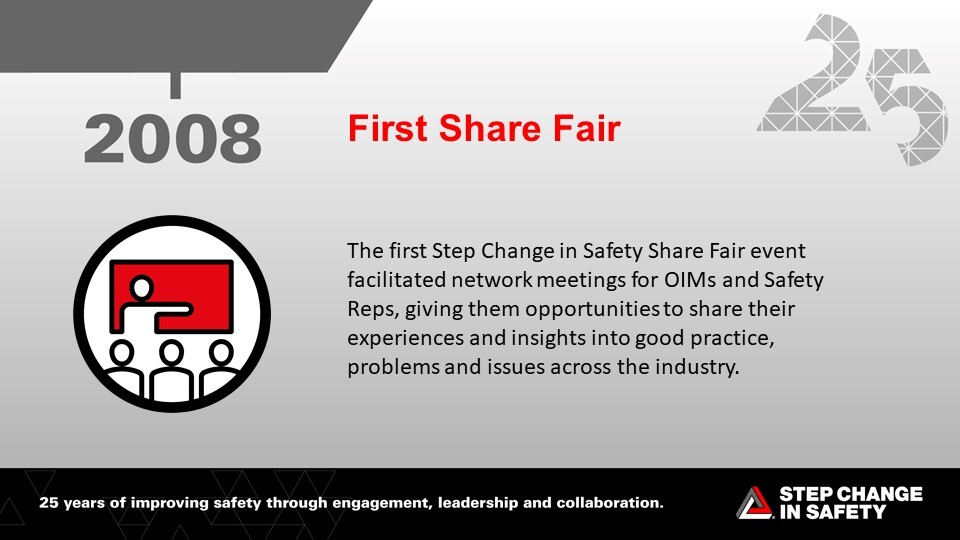25 Years of Step Change in Safety
Since its inception in 1997, Step Change in Safety has evolved and adapted to the changing needs of, and challenges faced by the UK energy industry. We have embraced new technologies, and supported the industry in equipping its workforce to identify hazards and ensure risk is properly controlled. Together with our members, we are improving safety through engagement, leadership and collaboration.
Celebratory Event on 8th September 2022
To celebrate its achievements over its 25 years, Step Change in Safety is hosting an event on 8th September, 2022 at P&J Live, Aberdeen.
The full day event includes:
- 25 years of resources, celebrating the wins
- Panel session – highlighting resources that have made a difference
- Offshore Safety Awards (in association with OEUK)
- Keynote Speech: Chris Roebuck - Change & Transition, Staying the Course
- Safety Quiz: participation from those attending and remote sites
- Step Change in Safety recognition awards
- Post-event snacks and drinks


Offshore Safety Awards 2022
Click here to find out more about the Offshore Safety Awards and submit your nominations.
Nominations close on Monday 4 July 2022.
25 Years of Resources and Initiatives
Over its 25 years, Step Change in Safety has created a wealth of quality resources and initiatives, some of which have shaped fundamental safety training and procedures across the globe.
Below is a reminder of just some of these, listed by year of production.
Vote for the most effective resource
Please help us identify the resource regarded as being the most effective at keeping our people safe by voting here.

This film covers the premiere of five films focused on mental health awareness. The five powerful films were launched in 2021 as part of a new resource pack for the energy industry. They feature interviews with people working in or associated with the energy sector, offering first-hand testimony about the way in which real-life triggers have impacted their mental wellbeing.
To watch and download the five films, click here

This film recognises the Seven Days for Safety campaign. Due to COVID cancelling face-to-face events, the online, week-long safety campaign saw the launch of new resources and webinars.
Browse and download Seven Days for Safety resources here

E-OBS is an electronic observation card system designed for the workforce. It enables users to record safety concerns and highlight examples of good safety practice.
E-OBS allows both installation operators and contracting companies to see their respective card data and allows the person who submitted the card to directly receive feedback about the points they raised.
To find out more, click here

Launched in 2018, the Major Accident Hazard Awareness resource is a series of films which describe what a Major Accident is and how everyone has a part to play in preventing one happening by ensuring the correct barriers are in place and are fit-for-purpose.
To find out more, click here

Following the publication of the CAP1145 report by the Civil Aviation Authority (CAA), Step Change in Safety contributed to improving helicopter safety by addressing some of the recommendations in the report which would aid survival in the event of a ditching. These include a process that ensures all passengers are sitting closest to an emergency exit that is suitable for their body size, upgrading breathing apparatus to allow users longer to exit a submerged helicopter and a clothing policy which means passengers wear suitable clothes underneath their survival suits.
To find out more, click here

2016 saw the launch of Safe Working Essentials, a simplified and standardised Control of Work system which aims to be more engaging for all, while helping improve safety. The tools cover elements which are fundamental to reducing the likelihood of accidents at work. These tools are now available in a digital format.
To find out more, click here

As part of a series looking back over the first 25 years of Step Change in Safety, this film highlights Joined-up Thinking’s 7Cs packs; control of work, complacency, communication, competency, commitment, culture and change management; factors which can be attributed to nearly all incidents. The animated films became instantly recognisable and popular with the workforce, leading to the creation of many more JuT films.
To find out more and view these films, click here

In 2014, Step Change in Safety launched its Human Factors Toolkit, an online assessment tool which allows users to identify opportunities for improvement within their own working environment The tool generates instant feedback on each of the categories assessed which helps individuals and their companies to make improvements in those focus areas.
To find out more and view these films, click here

On the 6th July 1988, the Piper Alpha Production Platform exploded, killing 167 men. It remains the world’s worst-ever offshore disaster. In 2013, to mark the 25th anniversary of the incident, Step Change in Safety produced a short film to commemorate the disaster and remind everyone of the continual need to guard against complacency.
The ‘Remembering Piper’ film can be downloaded here

There is clear evidence that a fully engaged workforce will drive a safer workplace. The Workforce Engagement Toolkit includes guidance on how to improve workforce engagement and an online survey tool which provides organisations a method to measure workforce engagement at worksites.
The toolkit can be downloaded here

Managing occupational health risks is challenging, due in part to the latency between exposure to the health hazard and the onset of its effect or illness. This toolkit is a method to review companies’ occupational health management systems and provides an indication of compliance with legislation and best practice.
Download the Workplace Health Workbook here

MIST was designed by Step Change in Safety members to standardise the knowledge and understanding of fundamental safety elements of the offshore oil and gas industry. The standard is now held by OPITO and undertaken by offshore workers worldwide.
Download the MIST - Helicopter Safety Video here

In 2007, Step Change in Safety transitioned from being funded by OKOOA and relying on members’ secondees to being independently funded by its own membership. This meant a more transparent and appropriate sharing of costs, a more robust and permanent organisation and a demonstration that industry was committed to fund industry-wide safety initiatives.

Introduced in 2006, the Boots on For Safety campaigns engage with the workforce to better understand the issues they deal with every day, and review how leadership can support. The campaigns have been a huge success and left a positive legacy within the industry.
Download the following Boots on For Safety resources:

Analysis of incidents indicated that lack of risk awareness and not following procedures are often contributory factors. In 2005, the Personal Responsibility for Safety (PRfS) guidance document was launched to assist in achieving an advanced safety culture in which everyone, regardless of position, acts responsibly and plays an active role in improving the safety of their immediate environment.
Download the Personal Responsibility for Safety guidance document here

With a large number of transient workers in the offshore industry, creating some standardisation is beneficial. In 2004, UK hospitals standardised the emergency telephone number for summoning cardiac arrest staff to 2222. Step Change in Safety identified that introducing a similar industry-wide approach to emergency calls on assets would improve the response to urgent situations. The number 2222 became the number to call offshore in an emergency and is still widely used today.
The film includes an audio clip from Doug Seivwright, an OIM with Ineos FPS.

Following the deaths of 11 workers in the North Sea in the early 2000s, Step Change in Safety, the IADC, HSE and other partners came together to analyse the incidents and share learnings. The Fatality Report was the product of this analysis. It describes the operations at the time and how each event unfolded, highlighting the key learnings in a simple format so that others could learn from these incidents and prevent similar situations from occurring in the future.
Download the Fatality Report here

The green armband policy was introduced in 2002 for passengers onboard helicopters to visually indicate that they are a first-time or infrequent visitor to an installation. They are not seated next to the main exit on the helicopter, so they can follow the lead of someone more familiar with routing and layout of the installation. The requirements defining who should wear a green armband are determined by the operator and can vary slightly from company to company.

The Safety Alerts Data Information Exchange (SADIE) launched in 2001 to facilitate sharing of safety information and improving learning across the energy industry. SADIE has been superseded by the Safety Alerts and Moments workgroup which continues to develop materials, based on real situations, to help improve workplace safety. The workgroup encourages contributions from those working in the industry and hundreds of safety alerts and moments can be browsed and downloaded from here

Vantage POB system was piloted in 2000. Four years later, it was officially launched with 14 of the largest UK North Sea operators having adopted the system. Vantage POB replaced several different personnel on board tracking systems and went on to become industry standard and today tracks the movement and certification of 1.3million people per year.

In 1999, the Elected Safety Reps (ESR) Network was launched. For Step Change in Safety to work and be embraced, it had to address the issues and challenges being faced by the industry. With Elected Safety Reps hearing the concerns of the workforce on assets across the North Sea, the ESR Network has become an effective conduit between the offshore workforce and onshore management. Find out more about the ESR Network here

The OIM Network was one of the first groups set up when Step Change in Safety was founded and brought together Offshore installation Managers to share experiences and good practice. Mike Milliner, who was chair of the network from 2000 until 2002 shares his memories. Find out more about the OIM Network here

Former Offshore Installation Manager (OIM) Jim Trodden explains why the Green Hat Policy's simplicity makes it effective and understood by all.
Download the Green Hat leaflet here

